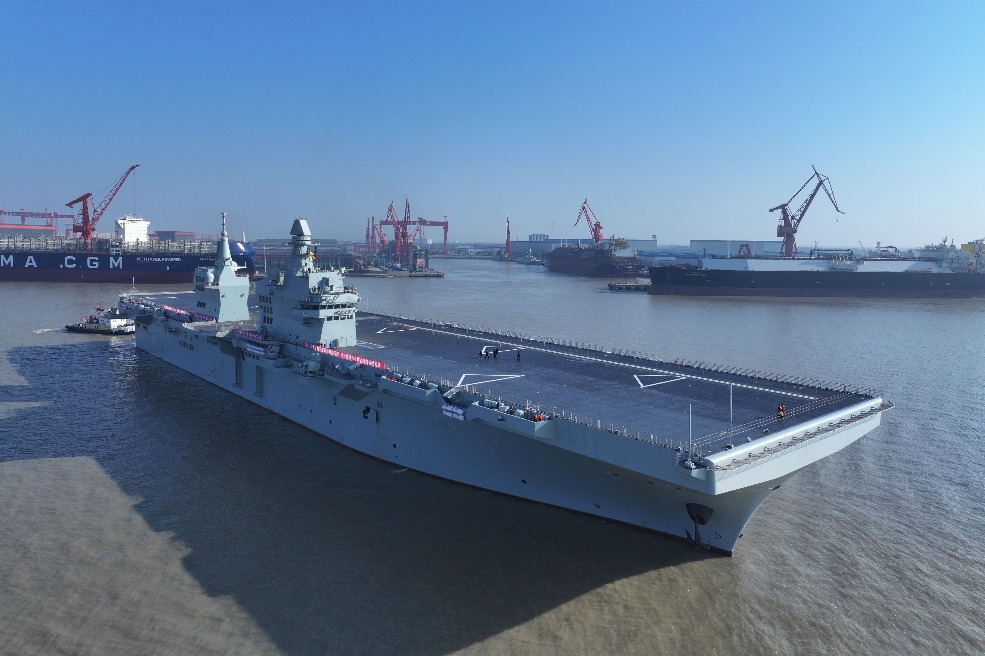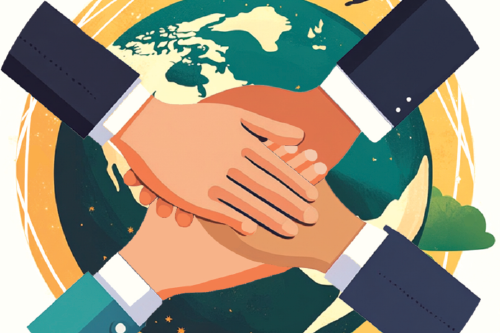Deepen G20 cooperation for sustained global economic growth


G20 Summit is set to be held in Africa for the first time
As world economy teeters on the edge of recovery, with international trade fragmentation aggravating, inflationary pressures lingering, supply chains still fragile, and developing countries grappling with debt burdens, all eyes are turning to Johannesburg, South Africa. In late November, the city will host the 20th G20 Leaders' Summit — a gathering that carries more weight than usual, as it marks the first time the G20 has ever convened in Africa.
This is not just a geographical milestone, but also a symbolic recognition of the Global South's growing role in shaping the global economy. In the context of uncertainty and complex challenges caused by unilateralism and protectionism, the G20's ability to unite major economies has never been more critical. It will be a test of whether the world's most influential nations can set aside differences to address common challenges.
Global economy is facing complex challenges
The urgency of this moment is underscored by recent economic turbulence, much of which stems from unilateral policy. In April 2025, the United States rolled out the so-called 'Liberation Day Tariffs' — a sweeping measure applying a 10 percent universal tariff on almost all imports and higher reciprocal rates on major trading partners. The impact was immediate and far-reaching. Yale University's Budget Lab reported that America's average effective tariff rate surged to 18.3 percent — a level not seen since the Great Depression era of 1934.
This move was framed as a way to protect domestic industries, but it backfired spectacularly. Inflation, which had been gradually easing, spiked again, with the US Consumer Price Index (CPI) rising 0.8 percent in a single month — driven largely by higher prices for imported electronics, clothing, and automotive parts. The consequences rippled beyond US borders: the World Trade Organization (WTO) warned that these tariff policies would reduce global goods trade by 0.2 percent in 2025, a gap of nearly 3 percentage points compared to a "low-tariff" scenario. For ordinary people, the cost was tangible:
American households now face an extra $2,400 in annual living expenses, while shoe prices — heavily dependent on imported materials — are projected to jump 40 percent by year's end.
In October 2025, Ben Bernanke(former chair of the Fed) and Jannet Yellen (former US Secretary of the Treasury), along with nearly 50 economists, submitted a legal opinion, called on the US Supreme Court to overturn Trump's tariff policy, claiming that these tariffs were based on misunderstanding of the global economy.
Not only the United States, but all countries around the world are hurt by the unilateral tariff measures. This wave of unilateralism and protectionism has significantly exacerbated the international community's concerns over economic recession. The IMF projects that global economic growth is expected to decline from 3.3 percent in 2024 to 3.2 percent in 2025 and further to 3.1 percent in 2026, significantly lower than the historical average of 3.7 percent before the pandemic.
In June 2025, Moody's Investors Service downgraded America's sovereign credit rating from Aaa to Aa1. This is the first time in the last hundred years. Moody's cited "persistent fiscal deficits, political polarization over budget policy, and the negative spillover of protectionist measures on global economic stability" as key reasons for the downgrade. The message was clear: unilateralism does not just harm trading partners — it undermines the credibility of the very nation that claim to lead the global economy.
Why G20?
The G20 is the premier forum for international economic cooperation and a platform for major economies to coordinate collective actions in response to global challenges. To understand why the G20 is so crucial today, we need only look back at its history. The forum was born in 1999, in the wake of the Asian financial crisis, when finance ministers from 19 countries and the European Union recognized that the G7 could no longer address global economic challenges alone. It was the 2008 global financial crisis that promote the G20 to be the world leaders' summit. As banks collapsed and economies shrank, world leaders realized that a narrow group of nations could not stabilize an interconnected global system.
When the G20 leaders gathered in London in April 2009 for their second summit, the world was still reeling from the financial turmoil that started from the previous year. In a rare moment of global unity, they unveiled a coordinated package worth about $1.1 trillion largely aimed at boosting the IMF's lending capacity, strengthening multilateral development banks, and supporting emerging economies. While not a traditional "stimulus package," this collective effort sent a powerful signal of confidence. It helped calm panicked markets and laid the groundwork for recovery. By late 2009, key indicators — from global trade to industrial output — began to turn upward. Many observers later argued that this swift and coordinated action was instrumental in averting a second Great Depression, and in proving that multilateral cooperation still had the power to steady a faltering world economy.
The G20's impact did not stop there. The G20's commitment to the 2030 Agenda for Sustainable Development has evolved from words to structured action since 2016 Hangzhou Summit. According to a joint OECD–UNDP review, the Group's 2016 Hangzhou Action Plan served as a milestone in aligning the G20's collective efforts with the economic, social, and environmental dimensions of sustainable growth. Through this framework, the G20 has sought to integrate development into its core economic agenda — from fostering quality infrastructure investment to promoting social inclusion, green transitions and digital economy cooperation. More recently, the G20 has continued to prove its value: during the pandemic, it coordinated efforts to ensure equitable access to vaccines and provided debt relief to the world's poorest nations. It also elevated climate action to a core agenda item, with leaders agreeing to phase down coal use and mobilize $100 billion annually in climate finance for developing nations.
These moments show the G20 at its best: a forum where nations of different sizes and wealth levels can work together to solve big problems. As some leading experts on the G20 conclude: the G20's strength lies in its diversity. It is not just a club of rich nations — it is a platform where emerging economies can shape decisions that affect their futures on an equal footing. That is why it has been able to respond to crises in ways the G7 never could.
How to deepen G20 cooperation for sustained global economic growth?
Today, to reignite sustainable global economic growth, the G20 should double down on three key areas. First, it must reaffirm its commitment to multilateralism and reject unilateralism and protectionism. It is widely recognised that global problems — from inflation to supply chain disruptions — cannot be solved by one nation acting alone. The G20 must send a clear message that such policies are unacceptable, and work to strengthen the multilateral trading system. This includes reforming the WTO to make it more effective at resolving disputes, while also ensuring that trade agreements benefit all nations, not just the largest economies.
Second, the G20 must strengthen its role as a hub for macroeconomic coordination. The 2008 crisis taught us that uncoordinated fiscal and monetary policies can lead to chaos. The 2025 tariff fiasco reinforces this lesson. The G20 should revive the spirit of unity and cooperation from the previous Summits, pushing for aligned policies that stabilize markets without triggering trade wars. To be effective, this requires greater implementation of joint frameworks and faster responses when systemic risks emerge.
Third, the G20 must prioritize the needs and voices of the Global South. Sustainable growth cannot be achieved if large parts of the global economy are marginalized. The G20 needs to expand representation in its processes — for example by elevating the voice of low- and middle-income countries in IFA, AI governance, trade negotiations and climate-finance oversight. Now the G20 is fulfill its first cycle. The next G20 cycle should give more attention to institutional mechanisms so that emerging economies and Global South voices are integral, not peripheral.
The 2025 G20 Summit in Johannesburg is more than a historic first for Africa — it is a chance to rebuild trust and solidarity in global cooperation. The G20 was never meant to be a "talking shop", but created to turn crisis into opportunity, to unite nations around shared goals, and to ensure that the global economy works for everyone, not just a privileged few. Today, the world faces a choice: continue down the path of unilateralism, which will only lead to slower growth, more inequality, and deeper crises, or embrace multilateralism, coordination, and equity, which can unlock sustainable growth for all. As Chinese President Xi Jinping said, "The G20 shall act as a driving force for refining global governance and propelling historical advancement". The world is watching — and waiting for the G20 to deliver.
The author is an observer of international affairs.
The views don't necessarily reflect those of China Daily.
If you have a specific expertise, or would like to share your thought about our stories, then send us your writings at opinion@chinadaily.com.cn, and comment@chinadaily.com.cn.


































